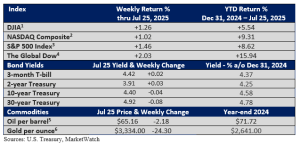One Big Beautiful Bill and You
Signed into law on July 4, the One Big Beautiful Bill (OBBB) Act introduces sweeping changes into the tax code that could influence how you plan for and pay your taxes.

Given the depth and complexity of the new law, our review is not all-encompassing. But we’ll touch on some of the key provisions.
1. To begin with, the bill permanently extends the lower tax rates established by the 2017 Tax Cuts and Jobs Act (TCJA). Without this legislation, those rates would have reverted to the higher pre-TCJA levels.
2. Starting in 2025, the standard deduction rises to $31,500 for joint filers, $23,625 for head of households, and $15,750 for single filers. As it was under the TCJA, it is adjusted for inflation each year.
3. The bill raises the deduction cap for state and local taxes (SALT) from $10,000 to $40,000 for taxpayers earning less than $500,000 in 2025, with the cap increasing by 1% annually through 2029. Beginning in 2030, the cap will revert to $10,000. The new cap will be phased out at $500,000.
4. Starting in 2026, taxpayers who take the standard deduction will also be able to deduct charitable contributions—up to $1,000 for single filers and $2,000 for married couples filing jointly. For those who itemize, the bill introduces a new charitable giving threshold: only contributions exceeding 0.5% of adjusted gross income (AGI) will be deductible. Donations below this floor will no longer qualify.
5. Starting in 2026, the estate tax exemption will increase to $15 million. This threshold will be indexed to inflation in the years that follow.
6. The current $2,000 child tax credit is increased to $2,200 for tax year 2025. It will now be indexed to inflation in future years. The income level at which the credit begins to phase out remains the same: $400,000 for couples filing jointly and $200,000 for single filers.
7. The OBBB repeals several green energy tax credits introduced under the Inflation Reduction Act—primarily those targeting individuals, such as credits for electric vehicles and residential energy efficiency improvements. The $7,500 tax credit for the purchase of an electric vehicle is eliminated for autos purchased after September 30, 2025.
New additions to the tax code: in place for 2025 – 2028
No Tax on Tips:
· Tip income will be exempt from federal income tax between 2025 and 2028. Phaseouts begin when adjusted gross income exceeds $150,000 ($300,000 for joint filers).
· By October 2, the IRS must publish a list of occupations that “customarily and regularly” receive tips on or before December 31, 2024.
Overtime Pay Exemption:
· Overtime wages earned from 2025 through 2028 will not be taxed. The exemption is capped at $12,500 per individual (or $25,000 per couple) and begins to phase out for individuals earning over $150,000 (or $300,000 for couples).
Newborn Savings
· Children born between 2025 and 2028, provided both parents are US citizens and have a Social Security Number, will be automatically enrolled in a federal savings account, dubbed Trump Accounts, with a one-time $1,000 deposit.
· These accounts allow for annual contributions of up to $5,000 (indexed for inflation).
· The account grows tax-deferred until account owners make withdrawals, which can only start at age 18. At 18, the account essentially follows the rules for an IRA.
Enhanced Deduction for Seniors:
· Seniors aged 65 and older will receive an additional $6,000 deduction during the 2025–2028 period. This benefit applies to both standard and itemized filers, but only those with a modified adjusted gross income under $75,000 (or $150,000 for couples) are eligible.
No Tax on Car Loan Interest
· Effective for 2025 through 2028, individuals may deduct interest paid on a loan used to purchase a qualified vehicle, provided the car is purchased for personal use and meets other eligibility criteria (Lease payments do not qualify).
· The vehicle must have “undergone final assembly in the US,” per the IRS.
These are some of the most significant changes to the tax code. If you have any questions, we’re here to help. As always, we encourage you to consult with your tax advisor to understand how these updates may affect your situation.
Sources:
Tax Foundation: “One Big Beautiful Bill Act” Tax Policies: Details and Analysis
IRS: One Big Beautiful Bill Act: Tax deductions for working Americans and seniors
Charles Schwab: Congress Approves Massive Tax and Spending Bill
Ameriprise: The One Big Beautiful Bill: What you need to know
Kiplinger: Here’s How the Child Tax Credit 2025 Amount Is Increasing Under Trump

